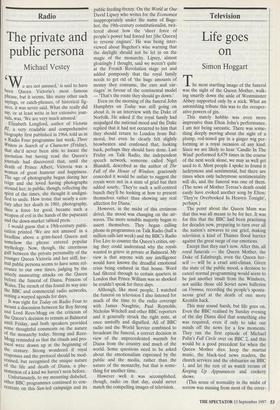Radio
The private and public persona
Michael Vestey
We are not amused,' is said to have been Queen Victoria's most famous phrase, but it seems, like many other such sayings, or catch-phrases, of historical fig- ures, it was never said. What she really did say, or at least write in her extensive jour- nals, was, 'We are very much amused.' Elizabeth Longford, author of Victoria RI, a very readable and comprehensive biography first published in 1964, told us in a Radio Four programme last week, Three Writers in Search of a Character (Friday), that she'd never been able to locate the quotation but having read the Queen's journals had discovered that, until the death of Prince Albert, Victoria was a woman of great humour and happiness. The age of photography began during her reign and she loved having photographs around her; in public, though, reflecting the spirit of the times, she thought it undigni- fied to smile. How ironic that nearly a cen- tury after her death in 1901, photography, then a force for good, became such a weapon of evil in the hands of the paparazzi and the down-market tabloid press.
I would guess that a 19th-century publi- cation printed 'We are not amused' in a headline above a grim-faced Queen and somehow the phrase entered popular mythology. Now, though, the enormous gulf between the private personality of the Younger Queen Victoria and her stiff, for- mal public persona seems to have some rel- evance to our own times, judging by the utterly nauseating attacks on the Queen before the funeral of Diana, Princess of Wales. The stench of this found its way into the BBC and commercial radio networks, setting a warped agenda for days. It was right for Today on Radio Four to mount a discussion between Sir Roy Strong and Lord Rees-Mogg on the criticism of the Queen's decision to remain at Balmoral until Friday, and both speakers provided some thoughtful comments on the nature of the monarchy today. Strong and Rees- Mogg reminded us that the rituals and pro- tocol were drawn up at the beginning of the century. Strong wondered if royal responses and the protocol should be mod- ernised, but recognised the unique nature of the life and death of Diana, a phe- nomenon of a kind we haven't seen before.
Unfortunately, to my mounting disbelief, other BBC programmes continued to con- centrate on this Sun-led campaign and its public feeding-frenzy. On the World at One David Lipsey who writes for the Economist inappropriately under the name of Bage- hot, the 19th-century constitutionalist, twit- tered about how the 'sheer force of people's power had forced her [the Queen] to reverse engines'. He was being inter- viewed about Bagehot's wise warning that the daylight should not be let in on the magic of the monarchy. Lipsey, almost gloatingly I thought, said we weren't quite at the French Revolution stage yet and added pompously that the royal family needs to get rid of 'the huge amounts of money they consume, the cars and car- riages' in favour of the continental model — 'That's the route they should go down.'
Even on the morning of the funeral John Humphrys on Today was still going on about it, in an interview with the Duke of Norfolk. He asked if the royal family had misjudged the national mood and the Duke replied that it had not occurred to him that they should return to London from Bal- moral, but even he clearly felt slightly browbeaten and confessed that, looking back, perhaps they should have done. Last Friday on Talk Radio, the independent speech network, someone called Nigel Blundell, described as the author of The Fall of the House of Windsor, graciously conceded it would be unfair to suggest the royals were not in a state of grief but then added sourly, 'They're such a self-centred bunch they'll be looking at how to present themselves rather than showing any real affection for Diana.'
However, in the midst of this cretinous drivel, the mood was changing on the air- waves. The more sensible majority began to assert themselves. They began calling phone-in programmes on Talk Radio (half a million calls last week) and the BBC's Radio Five Live to counter the Queen's critics, say- ing they could understand why the royals wanted to grieve in private at Balmoral. My view is that anyone with any intelligence would have known the dreadful emotional crisis being endured in that house. Word had filtered through to certain quarters in London that Prince William was so shocked he couldn't speak for three days.
Although, like most people, I watched the funeral on television I also listened for much of the time to the radio coverage with James Naughtie, Paul Reynolds, Nicholas Witchell and other BBC reporters and it generally struck the right note, at once unstuffy and dignified. All of BBC radio and the World Service combined to broadcast the funeral, a correct decision in view of the unprecedented warmth for Diana from the country and much of the world. Some questions need to be asked about the emotionalism expressed by the public and the media, rather than the nature of the monarchy, but that is some- thing for another time.
However well it was accomplished, though, radio on that day, could never match the compelling images of television.


































































 Previous page
Previous page